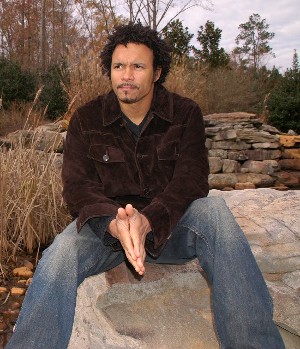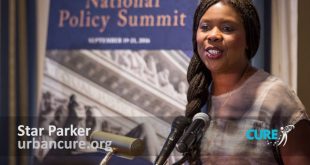Every day you faced the questions
Torn by the lot you had received
Every tear was a reminder
Of how I was conceived.
But in the middle of the confusion
You found strength to make it through
And now I can love and be loved
All because of you
The Man
Ryan Bomberger tears up when he recites the lyrics to “Meant to Be,” a song he wrote as a tribute to his birth mother—a woman he’s never met. The man behind the controversial pro-life billboard campaign, Too Many Aborted, was conceived in rape. His birth mother was white, and the rapist was black. Despite the circumstances of his conception, his mother allowed him to live.
 Bomberger was born in Pennsylvania in 1971, two years before the U.S. Supreme Court declared a “right to privacy” to abort in Roe v. Wade. In the late 1960s, however, states began allowing abortions in cases of rape, incest, and health of the mother or fetus. Prior to Roe, some states even allowed abortion on demand, including neighboring state New York. If Bomberger’s birth mother had wanted an abortion, the option was available. But she chose life.
Bomberger was born in Pennsylvania in 1971, two years before the U.S. Supreme Court declared a “right to privacy” to abort in Roe v. Wade. In the late 1960s, however, states began allowing abortions in cases of rape, incest, and health of the mother or fetus. Prior to Roe, some states even allowed abortion on demand, including neighboring state New York. If Bomberger’s birth mother had wanted an abortion, the option was available. But she chose life.
“There isn’t a day that goes by that I don’t think about how much life is a gift,” Bomberger said in a telephone interview. “I can’t help but think about my biological mother’s decision, the reverberation…that’s like a powerful, resurging thought in my mind every day, and that’s no exaggeration.”
The first child adopted by a white Christian family, Bomberger said he tried to find his birth mother in 2004 just to thank her, but was unable to locate her. “I still believe that some day, some way, she’ll be able to hear those words of gratitude. Her decision put me in a family. It’s a very different kind of family. An amazing, loving family.”
Bomberger called his parents “two of the most remarkable people in the world.” They had a heart for adoption even before they married. His adoptive mother’s parents were divorced, and her father was an alcoholic. “She was placed in an orphanage as a young child, and she made a promise to God at the age of five that she’d be a mommy to kids who didn’t have one.
Ten adopted and three natural children later, the Bombergers were a multiracial assortment that made the Jolie-Pitt family look like amateurs, with American Indian, Vietnamese, black/white, white, and black children. “People look at us like we’re some kind of freak show,” he said, laughing. “‘What is this?’ This is family. This is what it looks like.”
While the media hype celebrities who adopt transracially, Bomberger said, there’s a different level of sacrifice when you don’t know where the next check or meal is going to come from. But his parents felt they were called to adopt.
“They could have had a life of convenience,” he said. “Our family owns a department store, and they could have had a cushy sort of life, but instead they have thirteen children. There were lots of hand-me-downs, handed down hand-me-downs…they really understood what sacrifice was…they knew that adoption was a way of unleashing purpose, and our family was transformed by that. It was transformed culturally and in so many other ways, because of the beautiful act of adoption.”
Bomberger and his wife share this calling. He adopted his wife’s daughter, and the couple gave birth to two children, adopted another, and are considering adding a fifth child to the family through adoption.
The Life-Affirming Work
Bomberger and his wife started a non-profit organization called the Radiance Foundation, which he said grew out of their desire to help people embrace their own God-given purpose. It also reflects their desire to help people understand they have an intrinsic value and worth that no one can define or take away.
“The reason why we felt so strongly about that is because both my wife, Bethany, and I had gone through some really radical, personal destructive episodes in our lives. We were basically pulled out of our own self-destruction by God’s love and the hope that can come only by truth.”
Bomberger said he went through periods of self-loathing that nearly took his life. “My radical transformations came by relying on the very, very frayed thread of hope because of the faith my parents instilled in me. If they hadn’t, I wouldn’t be here today.”
A long-time adoption and pro-life advocate, Bomberger wanted to expand his part-time efforts into full time. He said there was something missing in other pro-life campaigns: abortion’s disparate impact on the black community. The former creative director for motion graphics broadcast media parlayed his skills and resources into starting a comprehensive organization that creates campaigns like the billboards. One of his billboards depicts a black child and the words Black Children Are An Endangered Species.
“We had no idea that our first billboard campaign would take hold the way it would and get the kind of media reaction it did,” he said. Some people asked why he focuses on abortion among blacks. “I always compare it to breast cancer awareness.”
Although men and women get breast cancer, the disease impacts women the most. Abortion kills unborn babies, regardless of race or sex, but it’s impossible to ignore or to gloss over the fact that black women have abortions at higher rates (between three and five times higher) than women of other races and ethnicities.
Bomberger’s work has attracted support from such pro-life advocates as Dr. Alveda King, niece of Dr. Martin Luther King, Jr.; Rev. Walter Hoye, president of the Issues4Life Foundation; Arnold M. Culbreath, urban outreach director of Protecting Black Life; and Day Gardner, president of the National Black Pro-Life Union.
“I didn’t know anybody in the pro-life establishment,” he said. “That was pretty powerful to get that kind of positive feedback and reaction from people who believe not just the messaging but were willing, in what others were calling provocative and controversial…to put their faces and their words behind it to endorse it.”
Bomberger has received thousands of positive e-mail from everyday people of different races thanking him for his work in the pro-life and adoption movements. “We speak to several hundred thousand people a year at various events and conferences…and to get the incredible feedback is very encouraging, knowing that we’re connecting to people, that we’re moving people, that we’re inspiring people. It makes all of our efforts—and all the denunciations from liberal groups like the NAACP and ACLU—worthwhile.”
Bomberger v. NPR
Bomberger’s billboard campaign led to an NPR “debate” between him and Rev. Carlton Veazey, president and CEO of the Religious Coalition for Reproductive Choice, formerly known as the Religious Coalition for Abortion Rights. He said he’d approached several key pro-abortion leaders to debate, and they continually turned him down. He didn’t reach out to Veazey, however; NPR approached Bomberger.
After previously interviewing with NPR for thirty minutes to talk about one of his billboards, only to be completely cut out of the three-minute segment that aired, Bomberger was skeptical.
“It wasn’t about me being spotlighted, but how do you cut out the person who created the campaign and explained the reason behind the campaign?” Despite this experience, he agreed to another interview. “I should have known better.”
NPR called Bomberger fifteen times in three minutes about the validity of his conception story. “How do I know that my story is really true? Because according to the enlightened senior producers at NPR, when you’re adopted, the agencies don’t tell the adoptive parents any of those details. They’re all private.” Not true, Bomberger said. “Adoptive parents are given every detail they possibly can be given.”
Bomberger wanted the opportunity to debate Veazey, a man who “apparently loves to use religion to justify killing,” so he agreed to appear. His skepticism was warranted. He said NPR censored his portion of the debate on the broadcast. “Their heavy editing of only The Radiance Foundation’s perspective, while preserving every word spoken by Reverend Carlton Veazey, revealed NPR’s typical liberal bias and uninformed defense of Planned Parenthood,” he wrote on his blog. NPR officially denied favoring the pro-abortion side and so far has refused to release the unedited version of the debate.
Fatherhood and the Future
Bomberger has found his calling, and he’s committed to spreading the message. He and Rev. Walter Hoye of the Issues4Life Foundation launched a bicoastal billboard campaign on fatherhood.
In previous campaigns, they talked to pastors across the country and other leaders about the need to “step up to responsibility… and deal with the myriad of issues that are plaguing the inner city.”
Bomberger intends to highlight the hypocrisy among leftists on racial disparities. For example, health care disparities typically are characterized as a negative. “But abortion is the only one that apparently has a positive connotation,” he said. For organizations like the National Abortion and Reproductive Rights Action League and Planned Parenthood, racial disparities in abortion, illegitimacy, and fatherlessness don’t seem to be a pressing concern.
“This is the first time we’re making [fatherhood] the focal point…and it’s crucial for us to awaken men to return to their role as providers and defenders…to be the kind of man that steps up to responsibility,” whether married or not.
The new campaign also will touch on child abuse, which occurs more frequently in female-headed homes with live-in boyfriends. “Where are the protectors?” Bomberger said. “It’s hard to address the issue of abortion and not talk about the other half of the equation.”
With many irons in the proverbial fire, Bomberger will contend with accusations that pro-lifers don’t care about children once they’re born. He’s living proof to the contrary. A strong advocate for transracial adoption, Bomberger is frustrated by blacks who oppose it, even as black children languish in the system. He could have languished as well, but Christians rescued him. His adoptive mother’s father threatened to disown her, but she’d made her decision.
“Losing a father to gain a son. I’m glad she went with the right one.”
Originally published at La Shawn Barber’s Corner on November 8, 2011
 CURE News and Clergy Blog News and Commentary for Christians
CURE News and Clergy Blog News and Commentary for Christians



